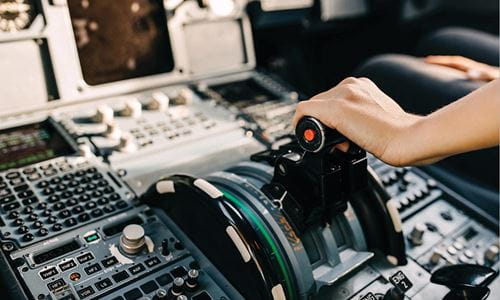
Supporting Pilots Through Furlough
A recent episode of the Air Line Pilot Podcast highlights a discussion between Capt. Jason Ambrosi, ALPA’s president, and F/O Quincy Fleming (United), a member of ALPA’s Strategic Planning Committee, about the resources ALPA makes available to support furloughed pilots. What follows is an abbreviated excerpt from that podcast discussion.
Ambrosi: We’re flipping the script a little bit. I’m going to be interviewed by F/O Quincy Fleming, about how ALPA is working to support pilots facing furloughs and career uncertainty.
Fleming: I’m also a double furloughee; and as we all know, unfortunately, our industry can be cyclical. The good news is, even though it’s been a while, ALPA has learned lessons from the past and we’re ready to support our members now. Every furlough cycle is a little different. Some come about from some sort of catastrophic event, and others are more of a slow slide. It really depends on the current state of the aviation industry and larger economic forces. We’re in a better position today than we were back then, both as a union and as an industry. We do have pilot groups that are struggling, but we have others that are doing well. To talk about our stronger approach to furlough support and the resources available to ALPA pilots, I’m joined today by Capt. Jason Ambrosi, ALPA’s president and a former furloughee himself.
Ambrosi: This is an important subject, and I’m glad we’re covering it. Thanks to you and the whole team for trying to make these resources better than ever.
Fleming: I appreciate that. It’s a passion project, definitely. You were furloughed early in your career. Can you tell me a bit about what that was like for you?
Ambrosi: I got hired at Delta over 25 years ago, and it was all blue skies and rainbows—and everybody thought it was nowhere but up. And then 9/11 happened, and I ended up getting furloughed in 2003. It was a gut punch. It wasn’t unexpected because of 9/11, but we had gotten to a point where Delta stopped furloughing. And then you go from the high of “Oh, I missed the cut,” to the sudden low of “Oh, by the way, I got four days’ notice,” and then I was out on the street. It was bad. Quite frankly, you get disappointed, you get disgruntled. You’re like, ok, I do appreciate the generosity of the Delta pilots paying for our COBRA benefits. But I was mad at the company, and I was mad at ALPA because it didn’t feel like there was much more.
There were senior guys who had never had a bad day in their career saying, “Furloughs are just part of the business, kid.” And I was like, “You’ve never had a bad day, Mr. Triple Seven captain, and you’re going to say that about our fellow members and about us.” It kind of left a bad taste in my mouth. I think it’s important now that we make sure that we’re there with every resource we have to support our pilots in need. We have a lot of carriers that are doing pretty well right now; but with 42 airlines, it can’t be everybody. And we really need to be there for the members who are struggling.
Fleming: I agree. And my experience was almost the same. Right after 9/11, I was gone. I just remember hearing that same thing, and I felt the same way. I was mad at everybody. You talked a little bit about how you felt about your ALPA experience. Do you have anything else to add?
Ambrosi: It was kind of “Oh, well it’s 9/11. It’s just part of the business.” But you felt left behind. We had a furlough coordinator at the Delta Master Executive Council who did a good job. But there was just that general feeling of “Yeah, I got mine. Pull up the ladder,” you know? At that point, it was kind of like, protect the pay rates, protect the pay rates. But they weren’t protecting the pay rates. The airline is losing millions of dollars. At some point they’re coming. And then, obviously, we lost…our pensions and everything. It took time, and now we’re a different group. We feel differently. We’re very member-driven. We’re more union-oriented, setting our organization up for the next generation. And I think it’s important that this is part of it—revamping what we do for our members in need.
Fleming: Can you talk a little bit about the current state of furloughs at ALPA?
Ambrosi: Check my math, but right now I think 383* pilots are furloughed in the Association. And compared to our size, that may not seem like a lot; but if you’re one of those 383 pilots, it means everything. It’s important that we make sure that we’re there for each one of those folks.
Fleming: So just thinking about the resources, and this is something that we’ve been working on really hard lately, can you talk a little bit about what some of the resources are and some of the things we’re trying to do for furloughees?
Ambrosi: The first step is the resources we have available on ALPA’s website. We’re rebuilding [the site]. We’re rebranding it, making sure that there are more tools there. Historically, we’ve offered some help on job interviews and different things. We’re really going beyond that now. We’re trying to make sure that we help these pilots find a place, making sure they have the resources they need about who to call to talk. It’s more than just finding another job. It’s dealing with the loss of your job. [It’s using] pilot peer support, talking through what does this mean to me? What is this situation? Talk to somebody who’s been through it before, like you, like me, and some of the other folks who’ve been furloughed.
Fleming: If you could go back in time, what would you tell young Jason, something that you know now that you didn’t know then, that maybe would’ve made your journey easier?
Ambrosi: In 2003? I would say reach out. Be in touch. Use the resources available to you. And don’t hesitate to call. We didn’t have the robust Pilot Peer Support program that we have now.
So call. Pilots talking to pilots, right? Sometimes when you talk to friends who aren’t in the industry or even professional support folks who don’t know the industry, they have a tendency to say, “Just go get another job.” But this isn’t Home Depot, this isn’t Lowe’s. You can’t just go get another job. So talk to people who know what it’s like, who’ve been there, fellow aviators. That’s an essential piece, using the Pilot Peer Support program and taking care of yourself. If you feel like you’re getting into a bad place, reach out and talk to these folks. Because that’s an essential resource that goes way above just trying to help you find another job.
Fleming: Accepting help is not a sign of weakness.
Ambrosi: Right. Admitting that you need help.
Listen to the Podcast
“President Ambrosi Shares His Furlough Experience,” can be found on Spotify, Apple, or your favorite podcast platform.












